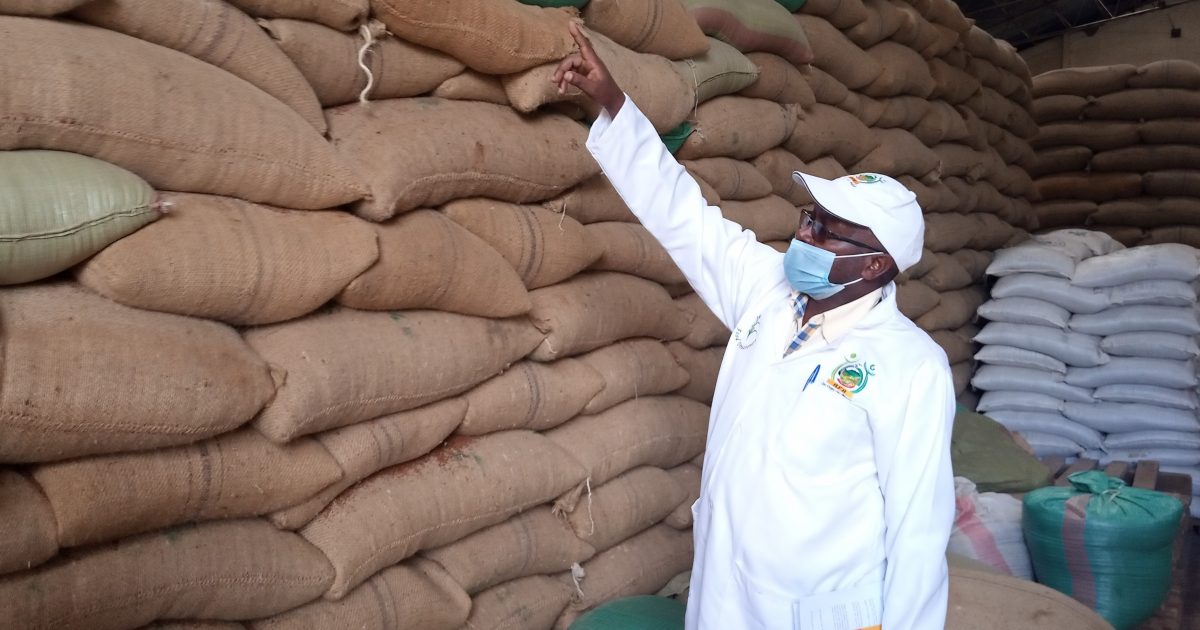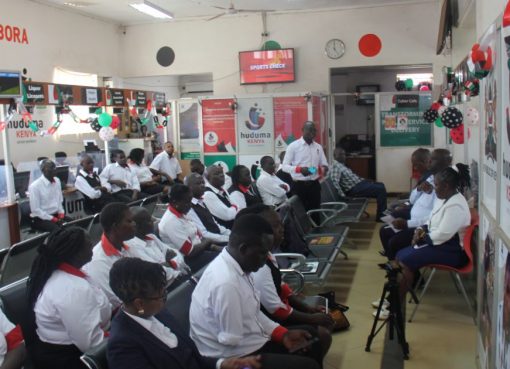The government has embarked on a raft of reforms to spur production and streamline operations in the Agriculture sector.
Key in the restructuring is the disbandment and subsequent merger of the Strategic Food Reserve (SFR) and the National Cereal and Produce Board (NCPB) as part of measures taken to consolidate the grain basket towards the realization of food security in the country.
The Agriculture Food Authority (AFA) directorate was also tasked with carrying out inspection and certification process of NCPB stores where farmers dry their maize to reduce cases of aflatoxin to ensure that the grains were safe for public consumption.
This was done under the Food Crops Regulations that were drafted pursuant to Section 40 of the Crops Act 2013. The Act gives authority to the CS Agriculture to draft and actualize laws that give life to the Crops Act 2013 which outlines broad guidelines on regulating the Agriculture Sector in Kenya.
Leonard Kubok the Interim Head, Food Crops Directorate at AFA says that the Food Crops regulations 2019 were approved for implementation by Parliament in May this year.
“We embarked on inspecting 121 NCPB warehouses in two phases and we have so far covered our silos in West Pokot, TransNzoia, Uasin Gishu, Nairobi and lower Eastern where we certified 26 of the stores and silos which scored more than 90 per cent of the total check list”, he said
Kubok explained that 32 other stores were placed under the second category certification pending minor corrective measures before they were given a clean bill of health

The Interim Head who was speaking to journalists during a tour of North Rift Depots noted that 63 other stores were recommended for re-inspection after they were found to have harmful roofing material including asbestos while other facilities were found unfit for storage of human food.
“Some requirement for a stores to get certification include sound pest management and seepage systems, easy accessibility, air ventilation, well done floors, pallets, CCTV systems, septic structures, fire extinguisher, enough toilets and including a canopy at main entrance”, Kubok said.
Kubok said phase one inspections were concluded in June and information about the status of the warehouses were submitted to NCPB management for redress in cases where facilities filed to meet the standards adding that 58 certified stores could take up at least 6.8 million bags of 90 kilogrammes.
On Phase 2 which was concluded in mid-October and covered 97 facilities in three regions of , South Rift, Northern and Lake/Western but the findings were yet to be released
“The stores that have been approved for certification are ready for storage and the ones with minor corrections have already begun, and NCPB has shown evidence that they have undertaken the corrective actions”, he said .
The requirements for warehouse standard for food storage uses a check list that has 122 check boxes as guided by Kenya standards, 2657 /2016 on warehousing and storage of bulk commodities and according to Kubok, they were guided by the Codex on bulk storage of commodities for silos and each facility was subjected to these criteria.
“At the moment we do not have any private facilities that have been certified but we have one private warehouse that has been inspected at Moi’s bridge area. We have also had interest from parastatals such as Kenya National Trading Corporation (KNTC) and new Kenya Planters Cooperative Union (KPCU) who have asked for the WRS inspection,” Kubok said
NCPB regional manager in charge of North Rift Gilbert Rotich said the WRS will give value for farmers as it will be classified into grades with grade one attracting a premium price compared to grade two.
“The system that had been piloted in 2011-2013 had no regulations, unlike now that there is a law that is governing the system which is a plus for farmers”, he said
Rotich noted that the board is now required to submit the number of maize bags delivered in all its institutions every month failure to which they will be penalized by the regulator.
Rotich explained that total storage capacity in North Rift is 4.7 million of 90 kg bags or 8.6 million of 50 kg bags. All stores under the management of the NCPB have a storage capacity of 21.8 million bags of 90 kg each or 39.2 million bags of 50 kg each.
Uasin Gishu County Executive in-Charge (CEC) of Agriculture Samuel Yego urged the government to create awareness to the Counties and also farmers before implementing the WRS.
“We are yet to see any team from Kilimo coming to the Counties so that we are in harmony. Farmers have started harvesting but the peak of maize harvesting period here in Uasin Gishu is from November till January”.
Yego explained that the County is projecting a good harvest of 5 million, an increase for last year’s harvest of 4.5 million bags.
A Grain farmer from Soy Sub County in Trans Nzoia County Arap Kollum said farmers do not have enough knowledge on the WRS and how it works.
“The government should come to the ground and do public participation and make the farmers understand what is warehousing receipt system. Most of the farmers including myself have taken it to mean that you can take your maize for storage and when time comes to sell it, you come to the stores again to pick your maize,” he said, adding that educating farmers is key and should be done immediately.
Kipkorir Menjo, Director, Kenya Farmers Association (KFA) said farmers have been told to use the receipts to access some funds from banks but noted that farmers need to be told what special interest will be charged since it should not be charged on normal market rate.
“Farmers require special attention and although the system is meant to streamline the challenges that have been there, at the same they should not create others which will burden the farmer”, he said .
Menjo added that with the food crops regulations still pending at the Attorney General’s office, there should be public participation so that farmers were fully engaged and that all the issues that they do not understand are addressed.
“A meeting with the National and County Governments is necessary to ensure the loose ends are tightened before the whole thing is rolled out. But if it is done haphazardly, farmers may not embrace it,” Menjo said.
Stephen Simiyu, Chief Operations Officer of Bora Foods and a trader in Nakuru County said the Agriculture reforms will liberalize the sector and free it from market distortions.
He however urged the Government to quickly operationalize the WHR systems so that traders can take the opportunity to create long term relationship with farmers and also have them with alternative options to store their grains, and sell their grains when the markets are better.
He noted that although Bora Foods has leased a warehouse from NCPB for storage of maize, there was need for the leasing rates to be reduced saying they were a little bit prohibitive.
“A trader like me would like the leasing rate to be reduced from the Ksh 200,000 per month that we have been paying to around Ksh 50,000. I however want to thank the President for the recent interventions which have seen some of the rates come down especially this year that the nation has been grappling with the Covid-19 pandemic,” said Simiyu.
Under the new reforms private sector will be allowed to participate in storage of the commodity under the Warehouse Receipting System (WRS) as NCPB will initially have to cede at least 25 per cent of its storage capacity across the country through competitive commercial leasing.
Early this year president Uhuru Kenyatta directed the Ministry of agriculture to ensure NCPB purchases maize from the farmers at a minimum of Ksh 2,500 and NCPB is now planning to buy 3 million bags estimated at Kshs7.5 million.
Operationalization of the WRS is expected to go a long way in contributing to the improvement of commodity storage, reducing average post-harvest losses, curbing value chain inefficiencies and increasing financial earnings to farmers, traders and service providers in the agricultural sector.
By Wangari Ndirangu




